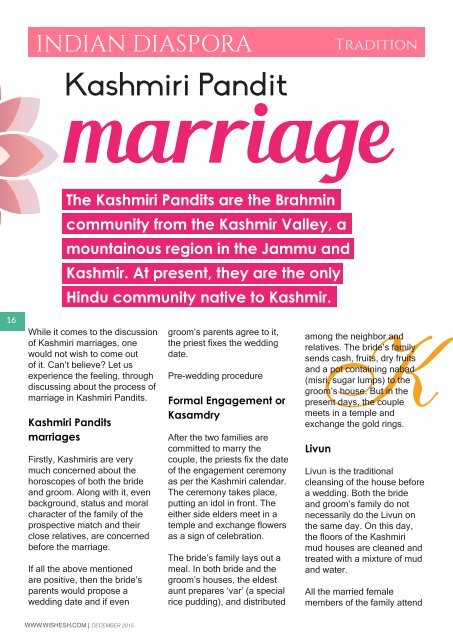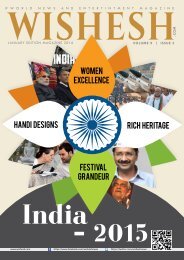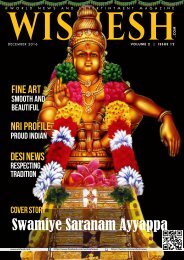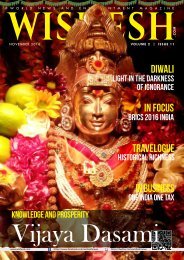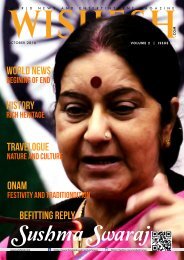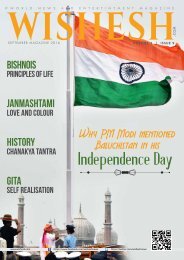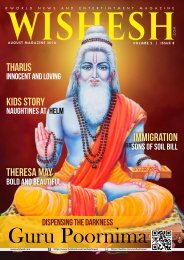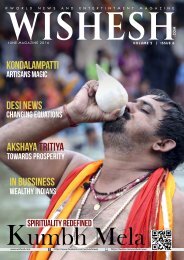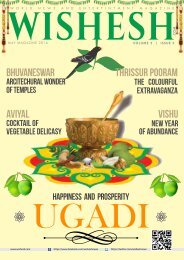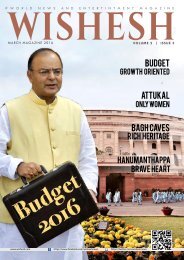Wishesh December Magazine 2015
Wishesh December Magazine has more excited stories of Diwali Festival of Lights, Karatar Singh Sarabha was an Indian Sikh revolutionary, Indra Nooyi Chairman of PepsiCo, Infocus of Make in India, Mark Zukerberg India Visit, Healthly Romantic Tips and many more on this month magazine.
Wishesh December Magazine has more excited stories of Diwali Festival of Lights, Karatar Singh Sarabha was an Indian Sikh revolutionary, Indra Nooyi Chairman of PepsiCo, Infocus of Make in India, Mark Zukerberg India Visit, Healthly Romantic Tips and many more on this month magazine.
Create successful ePaper yourself
Turn your PDF publications into a flip-book with our unique Google optimized e-Paper software.
INDIAN DIASPORA<br />
Tradition<br />
Kashmiri Pandit<br />
marriage<br />
The Kashmiri Pandits are the Brahmin<br />
community from the Kashmir Valley, a<br />
mountainous region in the Jammu and<br />
Kashmir. At present, they are the only<br />
Hindu community native to Kashmir.<br />
16<br />
While it comes to the discussion<br />
of Kashmiri marriages, one<br />
would not wish to come out<br />
of it. Can’t believe? Let us<br />
experience the feeling, through<br />
discussing about the process of<br />
marriage in Kashmiri Pandits.<br />
Kashmiri Pandits<br />
marriages<br />
Firstly, Kashmiris are very<br />
much concerned about the<br />
horoscopes of both the bride<br />
and groom. Along with it, even<br />
background, status and moral<br />
character of the family of the<br />
prospective match and their<br />
close relatives, are concerned<br />
before the marriage.<br />
If all the above mentioned<br />
are positive, then the bride’s<br />
parents would propose a<br />
wedding date and if even<br />
groom’s parents agree to it,<br />
the priest fixes the wedding<br />
date.<br />
Pre-wedding procedure<br />
Formal Engagement or<br />
Kasamdry<br />
After the two families are<br />
committed to marry the<br />
couple, the priests fix the date<br />
of the engagement ceremony<br />
as per the Kashmiri calendar.<br />
The ceremony takes place,<br />
putting an idol in front. The<br />
either side elders meet in a<br />
temple and exchange flowers<br />
as a sign of celebration.<br />
The bride’s family lays out a<br />
meal. In both bride and the<br />
groom’s houses, the eldest<br />
aunt prepares ‘var’ (a special<br />
rice pudding), and distributed<br />
among Kthe neighbor and<br />
relatives. The bride’s family<br />
sends cash, fruits, dry fruits<br />
and a pot containing nabad<br />
(misri, sugar lumps) to the<br />
groom’s house. But in the<br />
present days, the couple<br />
meets in a temple and<br />
exchange the gold rings.<br />
Livun<br />
Livun is the traditional<br />
cleansing of the house before<br />
a wedding. Both the bride<br />
and groom’s family do not<br />
necessarily do the Livun on<br />
the same day. On this day,<br />
the floors of the Kashmiri<br />
mud houses are cleaned and<br />
treated with a mixture of mud<br />
and water.<br />
All the married female<br />
members of the family attend<br />
WWW.WISHESH.COM | DECEMBER <strong>2015</strong>


